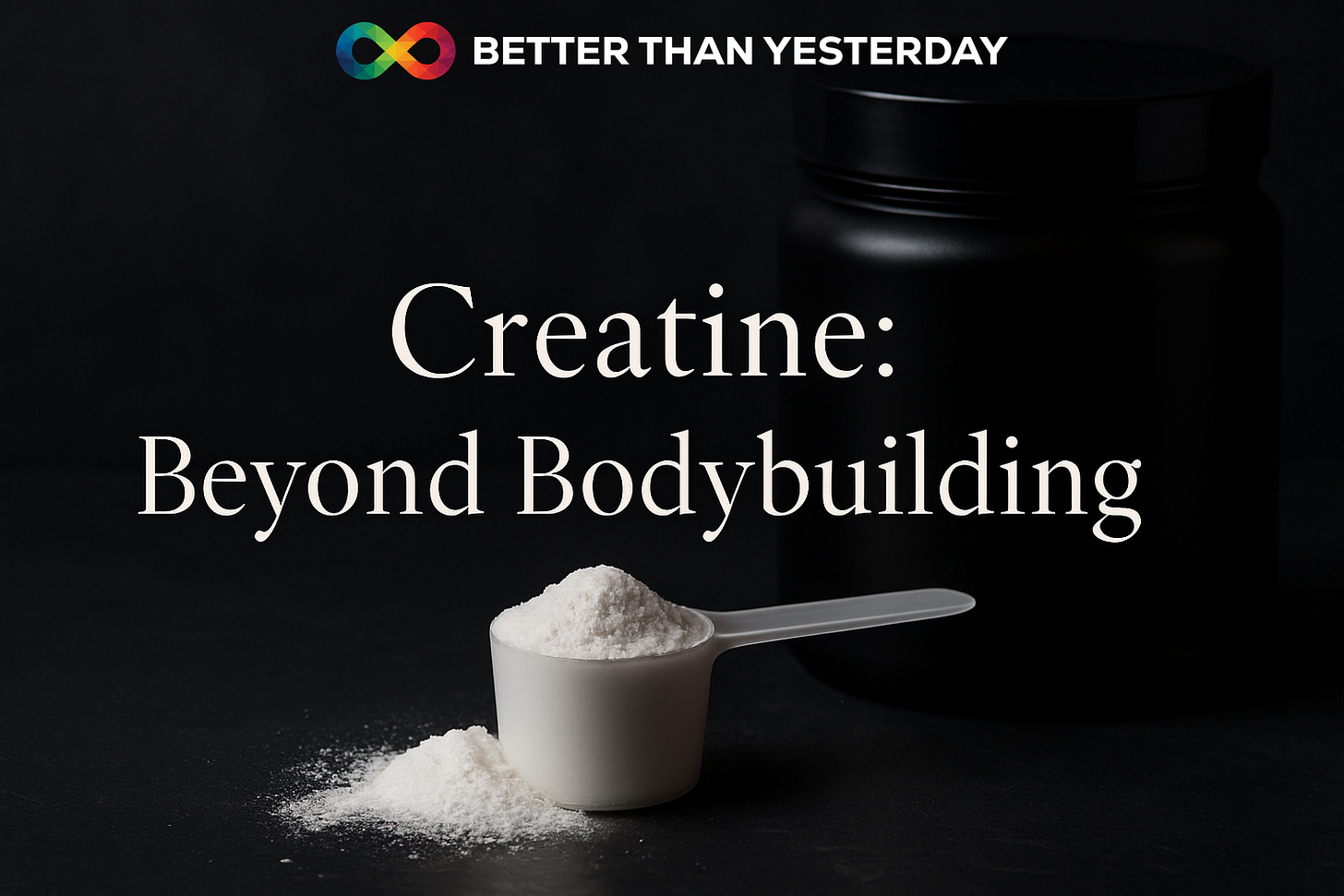Creatine for Brain Health: Benefits for Mood, Focus, and Fatigue
From brain fog to depression and long Covid — here’s why creatine is gaining attention beyond the gym.
I used to think creatine was just for gains...
Then the research started showing up in brain scans, mood studies, and even pregnancy trials.
Creatine — one of the most studied supplements in sports nutrition — is having a renaissance. But not in the way you think.
It’s now being explored as a neuroprotective, mood-supporting, cognition-enhancing molecule. And the best part? It’s cheap, safe, and already sitting on most supplement shelves.
Here’s what the science says in 2025. 👇
What is creatine?
Creatine is a compound your body makes in the liver, kidneys, and pancreas, and stores mainly in muscles and — importantly — the brain. 🧬
It plays a vital role in energy metabolism, helping cells rapidly produce ATP, your body’s cellular fuel.
You also get creatine from food — mostly meat and fish. 🥩🐟
But most people only get about 1g a day from diet. That’s not enough for optimal function — especially for some.
Who’s at risk of low creatine?
Your body makes some creatine, but the full daily need is 2–3g. You get the rest from food... unless you don’t.
👩🦰 Women
🌱 Vegans
🤰 Pregnant women
👴 Older adults
These groups often have lower levels, which may show up as:
🧠 Brain fog
💭 Low mood
😴 Fatigue
Some researchers now consider creatine semi-essential — not quite a vitamin, but close.
What happens in the brain?
Your brain burns energy fast — and phosphocreatine acts as a backup battery when it’s under pressure. 🔋
That makes creatine vital during:
Sleep loss
Mental stress
Illness
Aging
Supplementing with creatine helps your neurons perform better when energy demands spike.
Brain performance under pressure
In one study, sleep-deprived participants who took creatine processed information faster and had better memory.
📚 Another study on students found creatine reduced mental fatigue during exams.
This isn’t just a short-term perk — it’s becoming part of how we understand brain resilience.
Creatine and depression
🧠 Creatine supports neurotransmitters like dopamine and serotonin — both critical for mood.
In a clinical trial, people with depression who added creatine to therapy saw faster improvement.
And in those at risk — like vegans or women with hormonal shifts — the benefits may be even more noticeable.
Creatine in long Covid recovery
🚨 Brain fog is a hallmark of long Covid — and hard to treat.
A 2023 study found 4g/day of creatine improved focus, reduced fatigue, and raised brain creatine levels in long Covid patients over six months.
It’s not a cure, but it’s a strong sign of creatine’s potential in recovery protocols.
Pregnancy, birth, and fetal brain health
New research shows that low creatine in pregnant women is linked to:
👶 Preterm birth
🏥 Higher infant ICU admissions
⚖️ Lower birth weights
Creatine may also protect the fetal brain during labor — acting like a buffer during oxygen dips.
Still early days, but some scientists are calling for creatine to be part of prenatal nutrition.
Why women might need more
Due to hormone shifts and lower muscle mass, women:
Store less creatine
Excrete more in urine
May have higher mental performance benefits from supplementation
One study found 60% of women don’t meet daily needs — and nearly 20% consume none.
Is creatine safe?
✅ Yes — at 3–5g/day, creatine monohydrate is one of the most well-studied and safest supplements available.
⚠️ But:
Stay hydrated
Skip mega-dosing
Check with your doctor if pregnant or managing health conditions
Side effects are mild and rare — usually just bloating if any.
How to take it
💊 Start with 3–5g/day of creatine monohydrate.
📆 Take it daily — timing doesn’t matter.
🥤 Mix with water, a shake, or food.
No need to load or cycle. Just stay consistent.
Our Final take
Creatine is evolving — from gym essential to brain health ally.
It’s a low-cost, low-risk supplement that supports energy, mood, memory, and resilience.
Especially important if you’re:
🌱 Vegan
👩 Female
😵 Recovering from stress or illness
🧓 Aging and want to protect cognition
TL;DR
Creatine fuels brain power, not just muscle.
Most people get too little — especially women and vegans.
It improves cognition, mood, recovery, and possibly fetal health.
Safe, cheap, and wildly underused.
📚 Sources: Sagepub, Oxford, Sciencedirect



